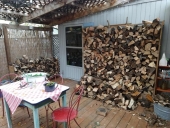Hi again!
Wow, message boards can often be a crapshoot, but this place is full of knowledgeable, helpful people. Isn’t the permaculture community fantastic! I am trying to address all your wonderful suggestions in this post, but I’m sure I’ll miss some – there were so many thorough responses!
Okay, my bachelors (almost 9 years ago) was in biology, with a focus on natural resources. I was a high school bio teacher for 4 years. My hope in studying sustainable development was to contribute to the establishment of a more ethical, sustainable way of life for communities, from a resource-use perspective. Sadly, as Gary points out, the term ”sustainable” is so subject to interpretation that I have found the overall course to be quite the opposite of inspiring. This program seems to be full of politicians jumping on a terminology bandwagon, and making lots of ”compromises” in the name of ”progress.” The only upshot is that I am free to do just about ANYTHING for the thesis.
I know the need to be realistic in my goals – I have budgeted a year for my research – and the challenge now is to choose ONE of my interests to study. I am interested in everything related to living an (indefinitely) sustainable life on this planet, and plan to be involved in all these topics in my future life, but I can only pick one to study.
What I can say, to help us narrow the discussion, is that I want my topic to be applicable to a scale above that of the single homesteader. All realistically sustainable future scenarios still involve communities comprised of of farmers and non-farmers. (But not on the industrial scale, like today.)
I could either do an experimental thesis or a modelling thesis. The first would actually compare physical systems with different variables, and the latter would involve getting numerical data on different farm or community parameters and compare it on the basis of something like the sustainability coefficients we have been discussing.
My current location is south-central Sweden, and there are no mature Permaculture farms around me. This has been a significant handicap. But I could remove the handicap by returning to the States. This is now a consideration that I am willing to entertain.
Comparing growing techniques on model plots would be achievable if I found a farmer willing to participate (I am not a landowner at present), but I would also have to frame it in terms of applicable knowledge for the larger issue of sustainable development. Same goes for l8bloomer’s very clearly defined, achievable suggestions. I would need to frame them so that my course leaders see them not just as an agriculture or horticulture question, but an actual development question. This could maybe happen with some brainstorms and modifications...
Sustainability coefficients for just about every nonrenewable or depletable resource have been developed by scientists around the globe. I would not need to do this myself (unless I disagreed with their methodology), I could just collect data on actual resource consumption in a farm, municipality, or other system and compare it against these already-established frameworks.
The calories-to-calories idea is a fabulous one. My problem thus far has been that I have no access to a mature permaculture operation for optimum comparison. However, if I could connect with farms in the states who are willing to participate, I am willing to come home. I think it’s high time.
Any brainstorms on how to frame a theoretical study on the maximum scale for permaculture? This is a very good question.
Briggs’ idea (to analyze the true price of conventional ag, and attempt to put a value (either in terms of energy or money) on the environmental costs of manufacture and disposal, and then compare the adjusted cost of conventional ag to permaculture) is theoretically very achievable. (And very interesting!!) I just need to find a mature permaculture operation and another mature farming operation that would be willing to allow me access to their input and output records. Any takers?
And BTW, duane’s link is very inspiring. That is one articulate farmer, with his ducks in a row.
We're making progress! This is good!



 Is there another way to affirm the project?
Is there another way to affirm the project?



